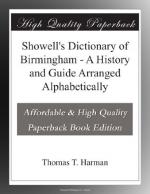Little Sisters’ Home.—Founded in 1864, by three French and two English members of the Catholic “Order of Little Sisters of the Poor,” the first home being at one of the large houses in the Crescent, where they sheltered, fed, and clothed about 80 aged or broken-down men and women. In 1874 the Sisters removed to their present establishment, at Harborne, where they minister to nearly double the number. The whole of this large family are provided for out of the scraps and odds-and-ends gathered by the Sisters from private houses, shops, hotels, restaurants, and bars of the town, the smallest scraps of material crusts of bread, remains of meat, even to cigar ends, all being acceptable to the black robed ladies of charity daily seen in the town on their errand of mercy. Though essentially a Catholic institution, the “Little Sisters” bestow their charity irrespective of creed, Protestants being admitted and allowed freely to follow their own religious notions, the only preference made being in favour of the most aged and destitute.
Magdalen Asylum and Refuge.—First established in 1828, the chapel in Broad Street being opened in 1839. Removed to Clarendon Road, Edgbaston, in 1860. There are usually from 35 to 40 inmates, whose labour provides for great part of the yearly expenditure; and it is well that it is so, for the subscriptions and donations from the public are not sent in so freely as could be wished. The treasurer is Mr. S.S. Lloyd.
Medical Mission.—Opened in Floodgate Street, Deritend, in 1875. While resembling other medical charities for the relief of bodily sickness, this mission has for its chief aim the teaching of the Gospel to the sick poor, and in every house that may be visited. That the more worldly part of the mission is not neglected is shown by the fact that the expenditure for the year ending Michaelmas, 1883, reached L643.
Night Refuges.—Mr. A.V. Fordyce, in July, 1880, opened a night asylum in Princess Road, for the shelter of homeless and destitute boys, who were supplied with bed and breakfast. The necessity for such an institution was soon made apparent by larger premises being required, and the old police station, corner of Bradford Street and Alcester Street, was taken. This has been turned into a “Home,” and it is never short of occupants, other premises being opened in 1883, close to Deritend Bridge, for the casual night-birds, the most promising of whom are transferred to the Home after a few days’ testing. A somewhat similar Refuge for Girls has also been established, and if properly supported by the public, these institutions must result in much good.




